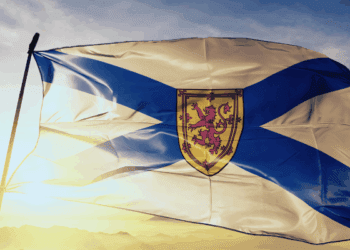Aquaculture is a clear case of Canada failing to live up to its natural and human endowment, says Brian Lee Crowley, in calling for reforms to antiquated property rights and cumbersome regulations that have hamstrung the industry for years.
MEDIA RELEASE
OTTAWA, April 10, 2013 – Canada needs a “Blue Revolution” of its own so it can start wringing from its waters the same bounty of food and prosperity that its land has yielded for generations, says a study by the Macdonald-Laurier Institute released today.
Aquaculture should be every bit as synonymous with Canada as wheat or beef, given the enormous length of this country’s coastline and the world-class expertise in fish farming that exists here, said the author, Brian Lee Crowley, managing director of the Macdonald-Laurier Institute.
“Instead, we are literally treading water,” “Aquaculture is one of those places where we have got it wrong.”
Canada’s aquaculture industry has stagnated in recent years, the victim of a cumbersome and inefficient regulatory system, restrictive tariff and non-tariff barriers, special interest groups, and an antiquated system of property rights that makes little distinction between wild fish gathered in the open ocean and those that are farmed.
“Only one factor explains our lack of progress: the rules and institutions under which we operate,” Mr. Crowley said. “We have not created the conditions in which it is worthwhile to invest capital in aquaculture.”
In Canada, aquaculture production has varied only slightly between 155,000 and 175,000 tonnes over the past decade. If anything, total production was slightly lower in 2010-2011 than in 2000-2001. While average annual rates of growth in the industry for the rest of the world are 6 percent or more, Canada’s output has fallen outright.
Yet, the so-called Blue Revolution – taking food production off the land and into the waters of the globe – is already well advanced, Mr. Crowley said.
“Aquaculture is the fastest growing source of food in the world at the moment. Global demand for seafood is increasing by almost 10 percent a year. A fifth of humanity finds its main source of protein in fish, and those people are concentrated disproportionately in the developing world.”
Global production reached 73 million tonnes in 2009, over seven times the total in 1984. Between 1970 and 2008, the worldwide production of food fish from aquaculture rose at an average annual rate of nearly 10 percent, while the world population grew at an average of less than 2 percent a year.
“And yet for the last decade in Canada the industry has at best just marked time, while other producers in New Zealand and Norway and Scotland and Chile have raced ahead,” Mr. Crowley said.
Aquaculture is a clear case of Canada failing to live up to its natural and human endowment, he said.
“The world beats a path to our natural resources, but not chiefly due to the resources themselves. What makes that endowment almost uniquely valuable in the world is that it exists within another vastly more important endowment of rules, institutions, and behaviours in Canada.”
Mr. Crowley said companies can invest billions of dollars to unlock opportunities, such as the oil sands, reasonably secure in the knowledge that the fiscal, regulatory, and contractual conditions they will face over a period of years are sufficient to recoup their investment and make some money.
“It is precisely the absence of several aspects of the institutional endowment that make our aquaculture resources highly undesirable as a place to invest”, he said.
“Secure property rights and stability of the regulatory regime were key in unlocking the long-term capital investment that has created such wealth elsewhere for Canada in natural resources. This is exactly what is lacking in aquaculture.”
Mr. Crowley calls for a five-point strategy. Foremost would be to establish the same private property rights in aquaculture that exist in agriculture. This would entail giving fish farmers ownership of the means of production and exclusive rights to the profit gained from using those means.
“If outright ownership is not possible, the alternative should be to issue high-quality leases and licences for a sufficient length of time to encourage investment in water quality, equipment, and fish health,” Mr. Crowley said.
In addition, Canada must eliminate tariff and non-tariff barriers that stand in its way of reaching markets. This will require reforming our thinking about food and agricultural trade, Mr. Crowley said.
“We need to stop giving up so much of our international trade negotiating power to protect a few small supply-managed sectors that serve only a tiny domestic market, and instead use our negotiating power to open up the international opportunities in foreign markets,” he said.
“Our grain farmers recently won this freedom. It is imperative that we not stop there, but integrate all of our food producers into that web of international rules and institutions that are part of the institutional endowment that confers success in Canada.”
Other strategies include creating an independent government agency to regulate and support aquaculture; replacing politicized decision-making with objective cost-benefit analysis in disputes concerning aquaculture; and reforming the cumbersome regulatory approach to aquaculture to encourage farmers and food processors to adopt new technologies and products.
Brian Lee Crowley (twitter.com/brianleecrowley) is managing director of the Macdonald-Laurier Institute, an independent non-partisan public policy think tank in Ottawa.
The Macdonald-Laurier Institute is the only non-partisan, independent national public policy think tank in Ottawa focusing on the full range of issues that fall under the jurisdiction of the federal government.
For further information, please contact:
Sean Osmar
Director of Communications
Macdonald-Laurier Institute
sean.osmar@macdonaldlaurier.ca
(613) 482-8327 ext. 103




